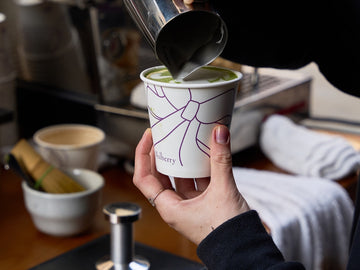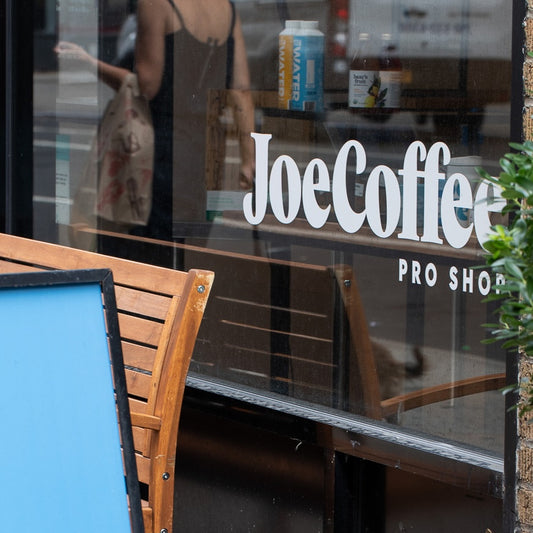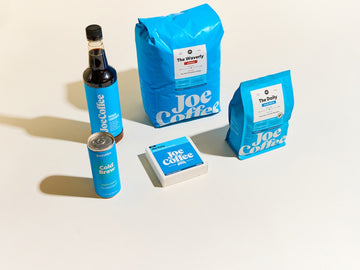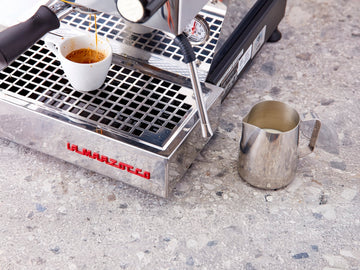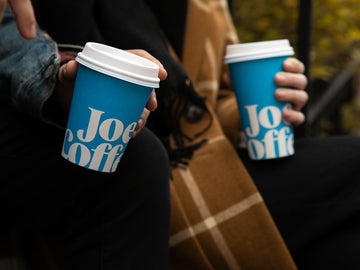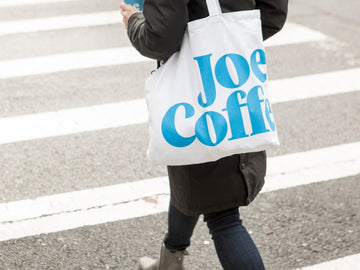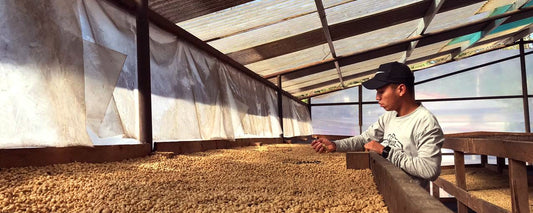imported
Categories
All articles
SOS Colombia: A Look at the Protests Through the Lens of Coffee
Over the past year, the world has started waking up to the fact that our societies are defined by their inequalities. For the first time in a long time, that fact united many of us across geography, class, and race. Here in the US we’re still working to carry forward the energy of racial justice activism that swept the nation in 2020, with the hope to create systems and encourage elected officials to work against inequality. The pandemic has widened and made more clear our view of inequity and this has informed a newly realized solidarity: our intentions and our lives have meaning, and we are tethered to each other through our humanity. Solidarity has become a theme and an ethical responsibility. Waves of activism have roiled communities across the globe as people have taken to the streets in protest of state violence, discrimination, economic inequity, political corruption, and much more. Protests were already occurring in Colombia but as they have resurged in the pandemic’s socio-political environment, it has been with a new, collective tenacity and as this ripples through global supply streams, we are taking the opportunity to examine our role and lend support.
Colombian coffee is on our single origin menu year-round (La Familia Guarnizo), and it’s also in The Daily for a majority of each year. Our business depends on those coffees, which are made possible by many smallholder farmer families in Colombia—we are inextricably connected with the people of Colombia through our business. Some of our most important lessons on the true meaning of “partnership” have been with the Guarnizo family in Huila, Colombia. [caption id="attachment_44819" align="aligncenter" width="1280"] Wilmar Guarnizo's farm, Huila, Colombia[/caption]At Joe, we have come to appreciate the value of working with trusted suppliers for sourcing green coffee. We rely on the trust those partners have built with producers through long term relationships and we use those relationships to educate ourselves and our staff, and to gain more context for the challenges facing producers in a given area. When it comes to understanding this situation in Colombia, as well as seeing how and where we can contribute to positive change, we found ourselves in conversation with our supply partner there, Caravela, and the close partners they facilitate our work with, the Guarnizo Family, to learn about what prompted these protests and what they expect to happen. Wilmar Guarnizo explained that where his farm is located, along with his siblings’ farms, the food and gas supply has been disrupted. Thankfully, many of the staple foods are grown locally in their community. Wilmar describes a general feeling of disenfranchisement, explaining that they feel disconnected from both the protest movement and the government, neither of which have historically served them well. Marisabel Vasquez, Marketing Manager for Caravela, notes that the situation looks different across the country. In the city where she’s from, Barranquilla, protests have been predominantly peaceful. In other parts of the country, such as in Cali, Bogota, Huila, and Bucaramanga, the protests have intensified, and have been rippling out to affect each city’s infrastructure. In Bogota, where Caravela’s main offices and in-country QC lab are located, staff coming in to work have to pay close attention to the planned protests because public transportation shuts down during those times because buses get damaged during them. And of course, the main impact is the effect on their coffee business, which has been quite extreme. Coffees are being brought down from the growing regions to local purchasing stations, but because of roadblocks, they can’t move the coffee out of the individual localities. Marisabel shares:
“We continue with our warehouses open, but as we're not able to move the coffee to the dry mill, there will be a moment when we run out of space (this happened back in 2016 when there was a truck strike) but we are trying to avoid this from happening. Additionally, we have not been able to move coffee to port, as you mentioned, the Buenaventura port is closed. Last week we tried moving coffee to Cartagena and Santa Marta ports in the Northern Coast (where as I mentioned things are much calmer up here) but containers are dammed and being held up and nothing has shipped. Our team in Colombia continues to work despite the challenges, but we really hope that we all come to a peaceful agreement, and that we can come out of this to a much better Colombia.”
We also checked in with one of our baristas, Oscar Gomez, who was in Colombia visiting his family and a business he recently started with his brother on a family coffee farm. He experienced protests and blockades while traveling across the city of Medellín, and was in the country for 6 weeks while the situation intensified. He shared with us that the government was limiting internet access in some places which was affecting people's ability to communicate with each other, and also that it was an intense atmosphere. He was thankful to be with family, and told us, "it’s a shame how people fight for power and put so many innocent lives at risk for their own pleasure."
We supplemented that perspective with our own research to see where major news outlets stand, knowing that international reporting can often come with political biases or contradictory, misrepresentative facts. That’s precisely why we feel the work of Human Rights Watch is so important; their nonpartisan work puts people first. Human Rights Watch is transparent about their research and methods, and they don’t take money from governments. Doing that means they have a wide, global scope and reach -- they are more likely to positively influence the change that is needed to stop human rights abuses wherever they work. Starting June 16, we will donate $1 per sale of a retail bag of La Familia Guarnizo to Human Rights Watch in order to support the rights, respect, and humane treatment of protesters in Colombia, and to contribute to the visibility of their message.
Overview & Historical Context
Latin America is one of the most unequal regions in the world. The people of Latin America have a long history of political protest in response to inequality and the behaviors of their governing powers. Even so, there were more civil rights protests in 2019 across Central and South America than in any year in recent history. In Colombia in particular, there were protests toward the end of 2019 through early 2020 in response to high unemployment rates, high rates of poverty with a low minimum wage, little perceived upward mobility for young people (including a lack of state-funding for higher education), and police brutality. President Iván Duque stands for a new conservative, right-wing party (it was only established in 2014) that has come under harsh criticism since he was elected in 2018. These protests by the people began peacefully, but over time turned more violent: aggressive police intervention led to over a dozen citizen deaths and more than 500 injuries.
The rise of the pandemic and subsequent lockdowns paused the protests, but they started up again in late April 2021 in response to a law passed by the government to increase taxes (including a tax on consumable goods that had never been taxed before) to generate revenue for pandemic-related budget gaps. Throughout the pandemic, unemployment and poverty rates grew manifold and the government’s solution to improving social security only involved new and increased taxation. In a state of diminished resources, this didn’t land too well. Among fears of a worsening financial crisis that would spiral out of control, and from the poverty of economic desperation, the people of Colombia took to the streets to protest. After 4 days of peaceful protests, the president redacted the proposed tax bill, but by then, popular sentiment had shifted and all other inequalities and injustices came back into focus, especially with the perceived traction of having directly influenced the president’s economic policy.
Now, the protests became an issue of being heard: the social issues, income inequality, poverty, and corruption they’d protested years before intensified because of the pandemic, and the government hadn’t made any changes. The people’s request to have citizen representatives present in negotiations with the president was not accepted, so the public felt they had no other option but to continue to take to the streets in order to be acknowledged. This led to greater societal unrest: local groups funneled their frustration into blockades in their streets, towns, and regions in order to get their government’s attention. They wanted to prove that they were needed for a national economy to function properly, so that their worth could be felt by everyone, including at the international level. The government’s response has been severe, and police presence everywhere was expanded. At present, there have been over 40 deaths (mostly citizens) and over 800 injuries. There have been allegations of censorship, allegations of disinformation, and harsh critical reactions by many international governments. Though facts may differ depending on who is reporting, the common thread is the ongoing presence of injustice. Coffee and other exports continue to be affected by significant delays due to roadblocks and port closures but the people of Colombia are asking to be heard, and they are doing whatever they can to amplify their message. We stand in solidarity with the people of Colombia and empathize with their cry to be seen, to be heard, to be respected by those in power.
Resources
Current Situation
Most concise overview with context: An Update on Colombia’s Ongoing Crisis (Caravela)
Protests In Colombia Have Halted Coffee Exports (Sprudge)
SOS Colombia: How Coffee Lovers Can Support The Colombian Crisis (Sprudge)
Colombia’s president withdraws tax reform after protests (Reuters)
Colombians march in eighth day of protests, police deploy tear gas (Reuters)
Colombia: Amnesty International denounces militarized response and police repression of demonstrations (Amnesty International)
Why Colombia's protests are unlikely to fizzle out (BBC)
Colombia protesters: We're not scared anymore (BBC)
Amid Protests And Police Violence, Colombia’s President Condemns Blockades That Have Stopped Delivery Of Food And Medicine (Forbes)
2021 Colombian protests (Wikipedia)
Bleak futures fuel widespread protests by young Colombians (AP)
Protestas - Colombia, “From cacerolazos to a neighborhood assembly” (Protestas Webseries)
Historical Context
Death of Colombian Teenager Drives Protesters Back to Streets (NYT)
The riots in Colombia hint at deep problems (The Economist)
Colombia’s Crisis Is an Urban Youth Crisis. Old Solutions Won’t Work (Americas Quarterly)
Colombia protests: Death of man tasered by police sparks deadly clashes (BBC)
Colombia protests: Bogotá placed under curfew amid fresh protests (BBC)
Protests across Latin America reflect a toxic cocktail of pandemic and recession (CNN)
2019: Protests and disruptive changes in Latin America (Open Democracy)
Latin America, It’s Time to End Police Abuse (Human Rights Watch)
Latin America’s Wave of Protests Was Historic—Then the Pandemic Arrived (Foreign Policy)
The Rebellion Against the Elites in Latin America (NYT)
U.N.D.P. says Latin America is wealthier but unequal (AP)
2019–2020 Colombian protests (Wikipedia)
Inequality and social unrest in Latin America: The Tocqueville Paradox revisited (World Bank)
The Normalization of Protest in Latin America (Vanderbilt University)
Latin America’s True Disaster May Be 2021 (Americas Quarterly)
Women-Led Businesses We Love
You know and love their delicious scones, cookies, turmeric elixir, and vegan bites, but do you know the women behind your favorite treats in our cafes? As we continue to celebrate Women's History Month, we're recognizing the many female founders whose small, local businesses provide the perfect pairings to our coffee, or in the case of one of these founders, brings us your favorite coffee-alternative!Here are their stories. Anjali Bhargava, Resilience Growing up surrounded by Indian culture, food, and philosophy, Anjali always trusted in the power of turmeric. It was her pursuit of wellness and her own health struggles which led her to start Resilience, in 2014. Today, you can find Anjali's sunny, immune-boosting elixir in our hot and iced turmeric lattes, or you can buy the elixir to get creative at home! What is your favorite part of what you do?I love that I make products that brighten people's days. Whether they are drinking it for their health or because they love the taste, it's usually a moment they relish. I think about that every time I take my own first sip of my daily cup of my elixir and it never fails to make me smile.Favorite way to drink Resilience?During allergy season I love it in hot water with a little honey. In the summer I love it in a glass of seltzer or lemonade!What advice do you have for women starting their own business?You're awesome and you have to trust your gut, but your success will be a team effort and the earlier you realize this, the more joy you will find in the journey. Find friends who are in the arena with you, they will understand you and keep you sane. Agatha Kulaga, Ovenly Agatha is the founder and CEO of Ovenly, an award-winning NYC bakery which happens to be one of our oldest wholesale partnerships! You may know Ovenly as the makers of the epic peanut butter cookie or the many delicious loaf cakes in our cafes. Along with her partner Erin Patinkin, Agatha has led Ovenly since 2010, seeing the brand as "an opportunity to change business for the better, while satisfying your sweet tooth." What is your favorite part of what you do? The most rewarding thing is being able to create joy for so many people on a daily basis through the work we do at Ovenly.What's your favorite thing to bake? I love to bake up cream scones because they are a blank (and delicious!) canvas for whatever sweet or savory flavor addition I'm in the mood for. A few of my favorite combinations are Cheddar Cherry Basil, Prune & Ginger, and Milk Chocolate & Salted Honey.Favorite Ovenly item?
That would be like choosing a favorite child! If I could choose three, they would be our Pistachio Cardamom Bread, Blackout Cake, and Peanut Butter Cookie.What advice do you have for women who are interested in starting their own business?The businesses we build can be our strongest voice. As woman entrepreneurs, we have the opportunity to change the world while redefining the idea of success. The key is to do things before you’re ready, otherwise someone might just beat you to it! Danielle Sepsy, The Hungry Gnome
Danielle Sepsy is the founder and Chef behind The Hungry Gnome, makers of the scones, muffins, and nutella-stuffed banana bread we introduced to our cafes last summer. Danielle's love of cooking began at the young age of 13 when she started a home business selling her scones to friends, neighbors, and local cafes and businesses. Today, Danielle is known as the "Scone Queen" by devoted fans, or "gnomies". Keep an eye out for her new seasonal Lemon Poppy Muffin, arriving in April! What is your favorite part of what you do? I love to create new recipes. Sometimes ideas come to me at midnight and I can’t sleep until I make it! I love to create baked goods and dishes that are new and innovative, but also really nostalgic, so when people take a bite it may bring them back to a really special moment in their life. Watching people eat and enjoy my food is the best feeling in the world, and it makes all the hard work worth it.What's your favorite thing to bake?My favorite item is the Chocolate Chip Scone partly because it is how the business started! I am also a serious chocaholic and so the melty semi-sweet chips combined with the buttery, crisp, yet moist dough is something I can never get sick of.What advice do you have for women who are interested in starting their own business?Learn from others first. Gain experience in the field your starting the business in so you can learn the ins and outs, no matter how “small” the job may be. If it’s a restaurant for example, learn how to do the finances, but also how to use (and fix) the dish machine, trust me it’ll all come in handy. Building relationships is also a key to success whether it be with vendors, potential customers, employees or perhaps a mentor. When I started my business I knew just to who call when it came to ordering supplies and ingredients to which employees I wanted to hire.
Caitlin Makary, Dank Brooklyn
Fueled by a passion for banana bread, Caitlin founded Dank Brooklyn in Bed Stuy in 2016. We love Dank not only because their mini vegan loaves are delicious, but because Caitlin has worked to build a company that truly supports its people and community. What is your favorite part of what you do?My favorite part of owning my business is working with other amazing owners / managers around the city and working with the groups we support. I love meeting new people, which is easy when we have clients all over the city! Being able to experience so much of NYC and combine my personal interests (bike riding, climbing, social justice) together with my job has been incredibly fulfilling.Favorite Dank item?The first and only item we offered when we started in 2016 was the Chocolate Chip Banana Bread; so that will always be a favorite. However the Lemon Matcha is probably my new favorite. I had no experience working in food prior to starting Dank (I used to be a clothing designer), so recipe testing still makes me a little nervous... we were supposed to launch this flavor in March 2020 and had to wait until November. I'm SO happy with how it turned out!What advice do you have for women starting their own business?Trust your instincts and your experience. The only way to try something new is to start from the bottom, which is hard if you are leaving an established career. Try to learn as much as you can from others, never be afraid to ask questions, and Google everything! I started this business with literally zero prior food experience; I had never even waitressed or bartended. I leaned hard on my design experience for our voice and branding, my experience working in an office to get our back systems set up and organized, and my friends/family who worked in food to give me feedback and advice, and my NYC community to show us love and support. 5 years later we've made it through a pandemic; and kept *all* of our staff paid their regular wages throughout. Never give up but don't be afraid to shift directions. I've worked harder on this business than anything else I've ever done, but it is my favorite job I've ever had. :) Karen Lauterstein, Sattva Vida Ever since we began carrying Karen's energy bites in 2017, they have become a mainstay on our counters, fueling many-a-New Yorker with their vegan, gluten-free goodness! After 20 years in corporate America, Karen channeled her passion for clean, home cooked food into Sattva Vida, which translates to "pure life" in Sanskrit. Sattva Vida's mission is to help busy people trade their processed, sugar-filled snacking habits to simple, fresh food. What is your favorite part of what you do?Hearing positive feedback from our customers about our Energy Bites! Especially, when they tell us our bites helped them stop eating processed sugars, or jump start a healthier lifestyle. I came from the corporate world, so I also love waking up every day (without an alarm clock!) and building my business in a tee shirt, jeans & a smile. It's exciting to carve a completely new path for myself and my company—learning, growing, and building every day.Favorite Sattva Vida energy bite?It's a toss up! I'm really feeling Off the Walnut these days. That flavor happens to be the first one I ever made.What advice do you have for women starting their own business?I keep two inspirational quotes above my desk, "Be brave, not perfect" and "You have to believe in yourself—that's the secret."* As for tactical advice, NYC has tons of free & incredible resources for new entrepreneurs—from mentors, to workshops, to full length courses with certificates. I've probably taken advantage of all of them, including: SCORE, Evergreene Exchange's SFPN (Small Food Producers Network,) Kauffman FastTrac (New Ventures Program,) the SBA etc.Specifically, SCORE has a team of 75 experienced mentors who you can meet with for free. They have various areas of expertise such as legal, marketing, retail, distribution, finance, etc., I've been meeting with my mentor, Elliot, regularly for years now. His guidance, support, mentorship and friendship has been invaluable. Go to SCORE, get a mentor or two. Take classes, network, and go to events & pitchfests. Research what your business will need early and often. Last but no least, have fun and enjoy what you do!*quotes, Reshma Saujani and Charlie Chaplin Kate Wheatcroft, Bien Cuit
In 2011, Kate and her husband, James Beard Award finalist Chef Zachary Golper, opened Bien Cuit in New York's Boerum Hill. Since then, Bien Cuit has become a neighborhood staple and destination for some of the city's finest breads and pastries (like the croissants you'll find in our cafes). With her husband overseeing the culinary side of the business, Kate has helped expand the business over the last decade to encompass two bakeries, wholesale, and e-commerce. What is your favorite part of what you do?My favorite part is starting new projects. This year during the pandemic we really built out our e-commerce business for the first time and it has been really exciting!What inspired you to open Bien Cuit?My husband and business partner is a baker by trade and he had spent a decade working as a baker. I agreed to help him get started. I think I didn't realize exactly what I was signing up for, but have had a lot of fun!Favorite Bien Cuit item?Chocolate croissant—it is a classic and I'm a huge sucker for both chocolate and flaky pastry.What advice do you have for women starting their own business?Make sure to pace yourself. It is easy to think you should take every opportunity that comes your way, but being really discerning I've found is the key to success.
Women in Coffee: Interview with Jeanine Niyonzima-Aroian
As we celebrate Women's History Month, we reflect on the many incredible women we work with throughout the supply stream—from strong leaders within our team to our wonderful partners whose work continually inspires us. One such partner we're proud to work with is Jeanine Niyonzima-Aroian, owner of JNP Coffee, an importing company focusing on promoting and trading African specialty coffee.We first met Jeanine at the New York Coffee Festival in October 2019 and her work in gender equity in Burundi resounded with us deeply. Soon after, we released a coffee from JNP Coffee to our Atlas Collection, a special line of coffees which aims to highlight each of our sourcing values. This coffee, from the Karehe Washing Station, was chosen to represent our sourcing value of ethics for the many ways it spoke to Jeanine's work to uplift and empower the communities where she works in Burundi. A year later, we're excited to welcome another coffee through JNP, Turihamwe IWCA, to our Atlas Collection later this month.In anticipation of this upcoming release and in celebration of Women's History Month, we present this interview with Jeanine. Hi Jeanine! Thank you so much for speaking with us. Can you introduce yourself?My name is Jeanine Niyonzima-Aroian, owner of JNP Coffee and founder of Burundi Friends International.After a 20-year career in international business, what led you back to Burundi, and ultimately into the coffee industry?Initially, what led me back to Burundi was a calling to give my people a helping hand. I was one of the fortunate ones who left the country to secure a higher education and was blessed with a great career. Burundi is one of the poorest countries on the planet. I knew I needed to do something. Through the non-profit, Burundi Friends International (BFI) that I founded in 2008 while living and working in California, we were able to empower women, youth and families to build self-sustaining communities. What started with teaching English Communications classes for youth that didn’t have the money to attend college has grown to serve more than 75,000 students across all provinces in Burundi. They have six container-libraries, dozens of smaller libraries (mostly in schools) and 1,000 English Clubs, plus full college scholarships for more than 40 students in Burundi.Like many, I stumbled into coffee by accident. On my trip to Burundi with the BFI board in 2010, I met the head of USAID who insisted that I consider the coffee industry. Later on, I ran into my cousin who was in coffee. He had just built a wet mill and asked me to help him. Then women farmers and members of IWCA Burundi, who had received goats through a BFI project, approached me to buy and market their coffee. Before too long, I found myself as a shareholder in several wet mills in Burundi. I took the opportunity to promote quality coffee with high premiums (a second payment to farmers), then collaborated with NGOs like PCI Global and BFI to bring financial literacy to farmers. Each step brought another element of sustainability to the model we established.Growing up in Burundi, was coffee always part of your life?Not at all. Tea is the culture. Coffee is a cash crop for farmers in Burundi. Most of them can’t actually afford a cup of coffee!What is JNP Coffee’s mission? Do you work exclusively with the IWCA (International Women's Coffee Alliance) chapter in Burundi?JNP Coffee’s mission is to use coffee to alleviate poverty in Burundi, to share Burundi’s exceptionally delicious coffee with the world, to educate and empower farmers, and to build sustainable communities through coffee. And no, we don’t work exclusively with the IWCA Burundi Chapter, although in 2018, JNP Coffee underwrote 100% of their production. Some of our current successful programs, like that of “Turihamwe Turashobora” coffees were with the farmers who were founding members of the IWCA Burundi Chapter.[caption id="attachment_46985" align="aligncenter" width="1280"] The women of Turihamwe take time to dance together in celebration of the joy and community that they feel.[/caption] What are some of the biggest challenges that women in coffee face in Burundi?Lack of access to land ownership, lack of education, and lack of opportunities in general.JNP Coffee is known for enabling gender-sensitive development strategies at origin. What does this mean?Through my mother, I learned quickly at an early age that if you empower a woman, you have a chance to improve the future of a family. When you empower a woman in a place like Burundi, you ensure that funds will go to feed the children and take care of the needs in the home. Women will share their knowledge with other women to improve the community’s quality of life. In our women’s savings and microlending program with BFI, the repayment rate is almost 100%. I can go on and on. Even in large US corporations, those with women in leadership perform better than their counterparts.How do you think supporting gender equity impacts the sustainability of the industry?I don’t see any other way. In places like Burundi, women are the ones working the land, taking care of the coffee trees among other crops. If we want to sustain the coffee industry, we need to emphasize quality, pay good money for it, and bring in other programs to allow farmers to diversify their crops and income, in addition to education. Also, in places like Burundi, contrary to countries like Brazil, the harvest is small and with the right support, the opportunity to produce mostly specialty grade-coffee every year is very attainable.JNP Coffee emphasizes the power and importance of partnership to support inclusive economic growth. Can you tell us a little bit about your work to promote financial literacy among women coffee growers?Education is critically important to economic development yet significantly lacking in Africa. In Burundi, less than 2% of the population has access to higher education. For most people, it’s not a lack of willingness or capability, but a lack of opportunity. I use every opportunity I have to bring education home, at origin. Through BFI, in collaboration with PCI Global, we have been able to bring a very impactful financial literacy program to women farmers, now expanded to youth in Burundi. The program provides a space where women can meet to learn about leadership, and a platform for saving and lending to each other. Some of the women farmers in the program pooled their resources and went on to start their own wet mill in 2019. They are now producing an exceptional coffee, like Turihamwe. To me, that is a good example of an inclusive economy, where women coffee farmers can build and own their own wet mill.How do you measure the impact of implementing equitable practices at origin? Is this something you’ve found challenging? We measure the impact of implementing equitable practices at origin through the example of the women of Turihamwe Turashobora group. By providing access to education, financial resources and leadership, women farmers could build and manage their own wet mill, and the cup quality also speaks for itself. It’s been very challenging in a place like Burundi, where women traditionally don’t have a voice. I struggle with it myself throughout the supply chain, but it does not stop me from persisting. It is a must in Burundi, where women are an untapped resource with tremendous potential.[caption id="attachment_37041" align="aligncenter" width="1280"] Jeanine inspecting drying beds at the Karehe Washing Station[/caption] Can you tell us about your experience as a Black woman in specialty coffee? How does it compare to your experience as a Black woman working with producers in Burundi?I love being a Black woman in coffee. This is where I belong. I can represent my fellow women farmers in Burundi right here in the consuming country. However, this does not make it any easier doing business as a Black woman in America. I face the same discrimination as any other Black person in the US, but when I go home to Burundi, the farmers of Burundi are my people and I owe them everything to represent them well. That said, I still face the same gender prejudice and inequality as a businesswoman in Africa. However, I view it as an opportunity to be a role model for other women in Africa, America and the world.What can you tell us about our upcoming release, Turihamwe IWCA, and the women who produced this coffee?Turihamwe coffee is a perfect example of an important story. Women farmers who were IWCA members got together, saved their money as they learned to do in our financial literacy program, and then built and started their own wet mill operation in 2019. Now they are producing a coffee that is outperforming many others. That’s why in Kirundi, its name means “together.” Indeed, together, we can succeed and make a difference. Thank you for allowing us this opportunity. All photos courtesy of JNP Coffee
Joe x Fincas Mierisch: A Chat with Amanda Byron
Inspired by our recent launch of The Mierisch Project Box Set, we took a trip down memory lane with Amanda Byron, Joe's first Director of Coffee, to learn more about the origins of our relationship with the Mierisch family. To explore these early beginnings, we would be remiss not to first introduce you to Amanda. Not only was Amanda Joe's first Director of Coffee, she was employee number one, helping our founder Jonathan Rubinstein open Waverly Place. In those early days of specialty coffee in New York City when latte art was still a novelty, Amanda was our go-to pourer of latte art, which meant that at first, our Waverly cafe hours were built entirely around her availability. During her 13 years at Joe, Amanda became a vital part of our growing company, touching nearly every part of the business, including getting our roasting operation off the ground in 2013. Our relationship with the Mierisch family, who is deeply intertwined in the Joe Coffee story, spans several countries and many years, but can be traced back to meeting Steve Mierisch in New York. We first met Steve when he worked in sales and customer service for our coffee provider at the time, Ecco Caffe (which later became Intelligentsia). Steve, whose family owns Fincas Mierisch in Nicaragua and Honduras, eventually went on to open the Pulley Collective, a shared roasting space at the Liberty Warehouse in Red Hook, Brooklyn. It was here in this 19th century waterfront warehouse, and thanks to Steve, that we got our start in roasting.[caption id="attachment_45316" align="alignnone" width="1280"] Pulley Collective[/caption]The Beginnings of Pulley Collective & Joe RoastingIn the days when we were purchasing coffee from Intelligentsia, Amanda often traveled to Chicago to visit their roastery. On one such trip, she can recall sitting in the booth of a dark bar with Steve and other folks from Intelligentsia when he told her about his idea to open a co-roasting space in New York. Although she'd never heard of such a thing before, she had a feeling it could be a good fit for Joe. Making the move to roasting our own coffee was something that had been at the back of Amanda and Jonathan's minds for some time." Once we got to a certain number of cafes, it just made sense to take production like this in-house," she explains. "I don't know how things would be if Joe didn't have that as a stepping stone."[caption id="attachment_45313" align="aligncenter" width="1280"] Amanda with Ed Kaufmann, Former Director of Sourcing, in 2014[/caption]From Pulley Collective to Sourcing From Fincas MierischOnce we got going at Pulley, it was only a matter of time before we began sourcing coffee from Fincas Mierisch and got to know the rest of the family. Although our first "Joe" coffee wasn't a Mierisch coffee (it was actually from our partner Wilmar Guarnizo), our sourcing relationship began soon after we began roasting all of our own coffee. Amanda recalls, "When we first started roasting, we only did 10% and the other 90% came from Intelly. But once we started roasting 100%, my guess is that a Mierisch coffee was on that menu very early on. It was also the first relationship we had where we traveled to the farm to select lots." When asked if she has any favorite memories from her sourcing trips to Nicaragua, Amanda says, "So many! I just remember thinking it was truly one of the most beautiful places I'd ever seen. I felt so lucky to be able to see the entire coffee process as it happened and to do that with the Mierisch family was really special. I loved riding in the back of the pickup truck, I loved the food (and the Flor de Cana!), I loved wandering through endless coffee trees and tasting coffee fruit. My understanding and love of coffee deepened and grew so much during those trips as did my relationships with the people who I got to travel with."[caption id="attachment_45314" align="alignnone" width="1280"] Amanda with Eleane Mierisch in 2014[/caption]Setting the Tone for Future PartnershipsVisiting the Mierisches in Nicaragua every year has become an integral part of who we are, and this foundation of friendship has truly set the tone for how we've evolved as buyers of green coffee. "There's a certain legitimacy of having real genuine relationships with the people who are producing your coffee. It takes you to a different level," Amanda says, "It not a 'direct trade' that's just for show." As we've grown and forged new partnerships around the world, we've held on to this as an important example of what a sourcing relationship can and should be. Importantly, as with any relationship, we believe that the value in our sourcing relationships must flow both ways. In this pandemic climate where coffee producers are shouldering an even greater share of the risk, it has been an opportunity for us to experience how we can share risk more equitably and a good reminder of how important it is to be honest business partners. That's why we were eager to collaborate with the Mierisch family on The Mierisch Project Box Set, to provide a sales outlet for this special trio of coffees which were grown, processed, imported, and roasted (at Pulley Collective!) entirely by the family. Shop and learn more about this collaboration here.[caption id="attachment_45345" align="aligncenter" width="1280"] On a sourcing trip in 2015[/caption]
Q&A with Fincas Mierisch
2020 has been a difficult year up and down the coffee supply stream. With demand on the decline, producers like our friends at Fincas Mierisch have had difficulties finding buyers for their high-quality, meticulously cared-for coffees. As roasters, we too have felt the constraints caused by the global health crisis, unable to be the good partners we have been in the past, but eager to help. This dynamic is what led us to collaborate on the release of the The Mierisch Project Box Set, a collection of three special coffees from the Mierisch family's farms in Honduras. As a vertically integrated business, Fincas Mierisch is responsible for producing, exporting, importing, and roasting this coffee. We're excited to be able to offer this incredible set directly to our customers—an effort to share risk with our friends and partners in an unprecedented time.On the heels of the release of this set, we took a moment to connect with Wingo Mierisch to hear how they've fared this year.Q: How has the pandemic affected you all personally?
A: The pandemic has been especially hard because we lost someone that was with Fincas Mierisch for over 50 years: Enrique Morraz. Losing him was like losing a family member. Our dear farm manager of our farms in Honduras passed away due to Covid in July.
Q: When did the worst of the pandemic hit Nicaragua, and what was the response from the community and local authorities?
A: May/June were the worst months for the pandemic in Nicaragua and Honduras as this was the time when hospitals reached full capacity. The Nicaraguan government initially didn’t take the virus very seriously, even claiming that it was just another strain of the flu so their response was really slow and inadequate. No restrictions or work closures were enforced in Nicaragua. Honduras had a better response, they closed their borders (essentially locking us out of Honduras since March) and restricted the days and where people could travel (also which business were allowed to stay open). However, these restrictions in Honduras did have a toll as many producers were not able to buy all necessary supplies to prepare for the next harvest and many had issues with coordinating exportation dates with the shipping lines that were working with minimal staff. In Honduras local authorities, such as the ones near our farms, restricted access in and out of the villages. Local authorities in Nicaragua were initially pretty relaxed but now there is an information campaign going on to inform and educate people on best practices to prevent the spread of Covid. Especially in Nicaragua, the brunt of the burden was taken on by individuals, communities, and private businesses to instill and follow safety protocols.
Q: Did you take on responsibility for your crew in ways that differed from the official/governmental response? How were your teams affected by all of that?
A: In Nicaragua we pretty much had to take full responsibility for our crew as the government response was inadequate and neglectful. We made sure to purchase and hand out masks and alcohol gel/spray to our entire team, enforced social distancing, created smaller crews/shifts, and we even have taken the extra step to hold meetings with our team and fellow producers to talk about best safety practices to prevent the spread of Covid. In Honduras, thankfully the government has been more helpful with their response so we do not have to take on as much responsibility with providing PPE, as the government was giving these out, but we still made sure to educate and try to enforce from afar the proper safety protocols. After the death of Don Enrique we paid out of pocket to get everyone at our farms in Honduras tested for the virus.
Q: Did you see a difference between the impact of the virus in Nicaragua and Honduras?
A: It’s difficult to tell exactly how Nicaragua was affected as the government hasn’t been releasing information (and the information it does release should be taken with a grain of salt). But from what we can tell Honduras, the country, was affected more probably because of the higher population and very densely populated major cities (Tegucigalpa and San Pedro Sula). Official death tolls in Honduras are much higher than the official death tolls in Nicaragua (but again, take the Nicaraguan death toll with a grain of salt).
Q: What are some of the long-term effects that you are experiencing now, ~9 months after the virus started to make waves in the world?
A: We’re noticing it’s definitely affecting everyone and every market. No one has escaped untouched. Early on this meant that many pre-orders were not fulfilled by our buyers and we were left with inventory very late into the season. In Nicaragua we just finished exporting our last container in September, we usually finish in June. For Honduras it meant we had to make a decision: leave the coffee in the country and run the risk of not making a significant return on the coffee, or take a chance and export it ourselves to the US to be sold spot. We went with the latter plan and it has fortunately worked out much better than expected and it led to this wonderful project we get to work with Joe Coffee.
Now, it’s just created uncertainty for both producers and buyers as no one knows how this pandemic will play out. As producers we worry that the market won’t be there to purchase our new harvest as we cannot afford another late season like last harvest. It will be all the more difficult as many buyers have already informed us that they will probably not be able to visit origin to purchase coffee. This will entail mailing out more samples than usual which does come at a considerable cost.
Q: Are there things you still need or still look for support for when it comes to safety during the pandemic?
A: I think we have mostly everything in place to continue preventing the spread of the virus in both countries, but educating people on the protocols that need to be taken and preventative measures will always continue to help.
Q: Were you able to participate in the Nicaragua Cup of Excellence (COE) this year since it wasn't cancelled due to Covid?
A: COE has not taken place yet but there are plans for it to go forward this year in Nicaragua and if it does, we will most likely participate. We are still unaware if COE will take place in Honduras which we hope it does.
Thank you both and Joe Coffee for your support on this project. With 2020 being a rough year for everyone we are super grateful and blessed to be working with you on this. It truly means a lot!
Q: How have you fared with the impact of Hurricanes Eta and Iota?
Honduras definitely took the largest hit from Eta, many casualties and damages, we were fortunate that no one from our team got harmed. The farms experienced mudslides and the dirt roads to and from the farm unusable but no real damage to the trees/harvest thankfully. We're extremely anxious to be able to go back, its been so long but I believe the borders are opening up soon. Nicaragua got a lot a rainfall, which damaged some small lots that were drying from the crazy flowering harvest, and the few ripe Laurina cherries that were there popped or fell to the ground (most likely got contaminated) but we still need to cup them first! We were very fortunate that no one was harmed but the Caribbean/Atlantic coast of Nicaragua was hit hard.
COE shared some really helpful links to donate to for Hurricane Eta.
https://www.gofundme.com/f/LSV-ETA-Relief-Fund
https://support.crs.org/donate/hurricane-eta
Field Report: Harvest During the Pandemic
Here in the United States, the pandemic dealt a painful blow to the specialty coffee industry with cafes shuttering across the nation in an effort to stop the spread of COVID-19. However, these same preventative measures have caused daily life to grind to a halt even in the most remote coffee-growing corners of the world, cutting off producers from the labor upon which they depend during harvest season, curbing vital transportation, and increasing production costs.Because the coffee harvest season arrives at different times around the world, some producing countries were just finishing their harvests when the pandemic began to spread globally, while in other regions, the harvest was just getting underway. With travel bans in place and our usual origin trips cancelled, we've been checking in on our partners virtually to see how they're adapting to these challenging circumstances. Here are some of their stories, which we'll be sharing in several parts over the coming weeks.
Part 1: Veloso Family, Brazil
Cerrado, Minas Gerais, BrazilHarvest Time: May-JulyThe Veloso family supplies a key component of many of our year-round coffees. Anike Wolthers of Red Container Coffee visited the Veloso farms during harvest and reports back.Read more: Part 1: Veloso Family, Brazil Part 2: Ejo Heza Cooperative, Rwanda
Mushubati, Rutsiro District, Rwanda
Harvest Time: April-MayThrough Ruth Ann Church of Artisan Coffee Imports and Kopakama's Quality Control Intern, Grace Izerwe, we present several interviews with Ejo Heza farmers.Read more: Part 2: Ejo Heza Cooperative, Rwanda Part 3: The Guarnizo Family, Colombia
Tarqui, Huila, Colombia
Harvest Time: April-July, October-DecemberFor the producers of longtime customer favorite, La Familia Guarnizo, collaboration among the family's nine siblings has been key to navigating the pandemic.Read more: Part 3: The Guarnizo Family, Colombia Part 4: Kibingo Washing Station, Burundi
Kayanza Province, Burundi
Harvest Time: April-MayBurundi's delayed and scattered government response prompted private actors like Kibingo Washing Station operator Greenco to take matters into their own hands.Read More: Part 4: Kibingo Washing Station, Burundi
Working Towards Becoming an Anti-Racist Company
Thursday, June 18th, 2020To everyone at Joe,Two weeks ago, I wrote you a letter voicing Joe’s support for the Black Lives Matter protests, with the promise to examine our company’s role in dismantling racism and confronting white privilege. Since then, we’ve begun to engage in deep reflection and discussion, and have carefully considered the thoughtful feedback so many of you have shared in response.When I founded Joe, my vision was to create a welcoming space that celebrates great coffee and everyone who loves it. As I reflect on our history, I think of all the folks who have found safe haven in Joe, finding a sense of belonging that they were not able to find elsewhere. However, I realize that despite our best intentions, we took a passive approach to challenging racial inequity, thinking Joe was immune to bias. The reality is that racism is not always overt—it can manifest itself in subtle and equally harmful ways, and we acknowledge our own complicity in perpetuating institutional racism.It’s time for us to dig deep, confront our historical policies and behaviors, and work to actively design our company systems and processes to champion racial equity. To that end, I want to share the early beginnings of how we’re approaching this work.Listening & Education:Before we can take meaningful steps towards long lasting change, we need to first look inward, listen, and learn. This means reckoning with past harms, understanding the lived experiences of folks in our community, and confronting how bias affects us as individuals and in our business operations. We respect that the onus is on us to educate ourselves, but want you to know that we are listening, and we are committed to holding space for challenging conversations. This is work that we must do, as an employer, to genuinely be in service of our staff.Here’s where we are starting:
In an effort to respect the boundaries of our staff while also providing a platform to participate, we have created an anonymous submission form. This form can be used to share experiences that have made folks feel discriminated, marginalized or othered in the workplace, ideas for policy change or new practices to implement, or general feedback. We understand it is unfair to rely on our most affected staff to tell us how to change and that any insight into those experiences is a gift, but we also feel it is necessary to give an outlet for those who want to share.
Create a repository of anti-racist educational resources and facilitate dialogue
Require training on unconscious bias for all employees
Address coffee’s roots in colonialism and slavery through our education program
Policy:We can’t create a welcoming place for our BIPOC employees to grow professionally without taking a critical look at our internal policies. Although policy reform will surely be a continuing conversation, we will immediately work on:
Fully auditing our employee handbook and company policies with an anti-bias lens
Reviewing our in-store safety, conflict resolution, and escalation procedures
Recruiting & Hiring EffortsWe have always cherished diversity on many levels at Joe, and yet we have much more work to do, especially when it comes to diversity in middle and upper management. Black and Brown folks are significantly underrepresented in our industry and the specialty coffee community has not done enough to change this. We believe in making coffee more approachable to everyone, and we will play an active role in building better representation by:
Connecting with more diverse candidate pools and partnering with community organizations dedicated to the professional development of BIPOC
Examining our hiring practices and investigating blind hiring methods where ethnic/gender/age/class signifiers are omitted from resumes
Training interviewers to erase potential bias
MarketingWe spend a lot of time thinking about inequities throughout the coffee supply chain and finding ways to communicate these complexities to our staff and customers, often focusing on stories about our current producer partners in our marketing. However, coffee has a history of colonialism and inextricable links to the slave trade—these less “palatable” parts of history often don’t make it into the narrative. We understand that it is our duty to tell the full story, and we intend to engage with these truths better in our storytelling.Moving Forward & Staying AccountableIn January, we established a cross-departmental culture working group called the Joe Cultural Advocacy Team (J-CAT). The purpose of this group was to pave the way for conversations about how Joe, as we grow, can be a better employer for all Joeys. Because COVID-19 forced us to reduce our business to a skeleton crew, many of the members of this team were temporarily laid off. In an effort to immediately begin building a roadmap for change in the interim, we formed an anti-racism task force in the week following our initial statement. This committee will be responsible for overseeing this work until we are able to partner with J-CAT again to carry the work forward. Until then, we intend to meet regularly to advance discussions, establish goals, and build timelines. Clearly, there is a lot of work ahead. Our next steps may include missteps, but we won’t let up. I am hopeful that with the help of the entire Joe family, we will become a truly anti-racist organization, an embodiment of the original vision for Joe Coffee.Jonathan
A Letter from our Founder
Friday, June 5th Dear Joe,I want to take a moment to acknowledge the pain all of us are feeling over the injustices of the last week.George Floyd's senseless death added another name to a long list of victims of systemic racism and police brutality, awakening a long pent-up fury in communities across the country.I want you to know that I share in this outrage and that Joe stands in unequivocal solidarity with those marching in the streets for Black lives. https://frpiluleenligne.comTo witness these mounting injustices, including the treatment of innocent protesters this past week, has been deeply troubling.For this to happen while we as a country are dealing with the trauma of the covid-19 pandemic, adds to the pain.However, I recognize that the pain we feel in this moment is insignificant in comparison to the suffering inflicted against Black people in this country for generations.Our own role as a company in condemning and dismantling racism is not lost on me, and I realize we have likely not done enough.I am committed to ensuring we do better.This will involve a lot of listening, learning (and unlearning), and difficult, introspective conversations.It will involve taking stock of our own values, of which "community" is one, putting them into practice and holding ourselves accountable to them.While it's evident that radical change is needed, as a business that is simultaneously reckoning with the dire financial realities of surviving this pandemic, we at Joe Coffee have to ask ourselves: what meaningful actions can we take in this moment, and what work can we do to ensure that we emerge on the other end of this pandemic a business that is actively contributing to long lasting change?Make no mistake: public statements and donations matter today, but the work of becoming anti-racist is ongoing.The road ahead is long, and progress will not come without mistakes along the way, but the key is to keep forging ahead with an open heart.Right now, we are actively listening and taking time to educate ourselves.We commit to examining our employee handbook, our policies, and our own unconscious biases, actively engaging with you, our team members to create avenues for dialogue, and collaborating with our community at large.Joe Coffee will always be a place where everyone is welcome, and everyone belongs. This means you all have a voice here. I invite you to share your feedback about diversity: whether they are issues you think need to be examined, or ideas about how we can do better. Jonathan
Bright Tomorrow Iced Coffee: a Seasonal Drink You Can Make at Home
One of our favorite parts of the changing seasons in New York is the opportunity to capture the essence of the weather in our rotating featured seasonal beverage. We get especially excited about this because all of our drinks are selected through an in-house competition, with Joeys from across our community entering their own creative conceptions. It’s a way for us to celebrate not only our city and our coffees, but also our people. The final privilege is sharing these delicious drinks with our customers. Since current circumstances are preventing us from sharing this joy with you all in person, we decided to come up with an easy to make at home seasonal drink so folks can still enjoy a pick-me-up when we all need it most. Usually our seasonal beverages are espresso based, building upon our Waverly Espresso but we decided to shift gears this season to make this drink something anyone can make at home while highlighting a coffee that is near and dear to our hearts, the Rwanda Ejo Heza.
You can read more about why the Ejo Heza is special to us on the here, but the vibrant and mouthwatering flavors of stone fruit and custard with intoxicating florals make it a perfect fit for welcoming springtime in the city.
In our Bright Tomorrow Iced Coffee we pair flash brewed iced coffee with a cardamom-rose syrup to complement the fragrance and complexity, and just a splash of lime juice to boost the vibrancy. All of this is shaken together to give the drink a silky mouthfeel and served with a twist because we all deserve a treat right now. Bright Tomorrow Iced CoffeeIngredients:
6oz flash brewed Rwanda Ejo Heza*
¾ oz cardamom-rose syrup (see note)
¼ oz lime juice
Lime peel, for garnish
Directions:
Add iced coffee, cardamom-rose syrup and lime juice to a cocktail shaker with ice and shake vigorously for 15 seconds.
Double strain over fresh ice into a collins glass or your favorite drinkware. For an effervescent touch, top with seltzer water.
Express a lime peel and garnish with a twist
* See our Flash Brewed Iced Coffee Recipe here (makes approximately 17 oz)Note:
Cardamom-Rose SyrupIngredients:
1 cup raw sugar
1 cup water
5g whole green cardamom pods
5g dried rose petals
Directions:
Mix the water and sugar in a saucepan and set it over medium-high heat, stirring until the sugar is dissolved.
Gently crush the cardamom pods in a mortar and pestle.
Once the simple syrup is nearing a boil, add the cardamom and rose buds, reduce the heat and cover. Let the mixture simmer gently for 15 minutes.
Strain the syrup and let cool before storing in the fridge.





